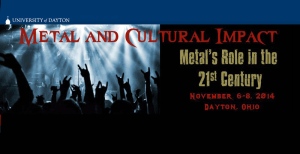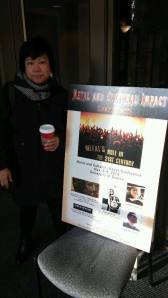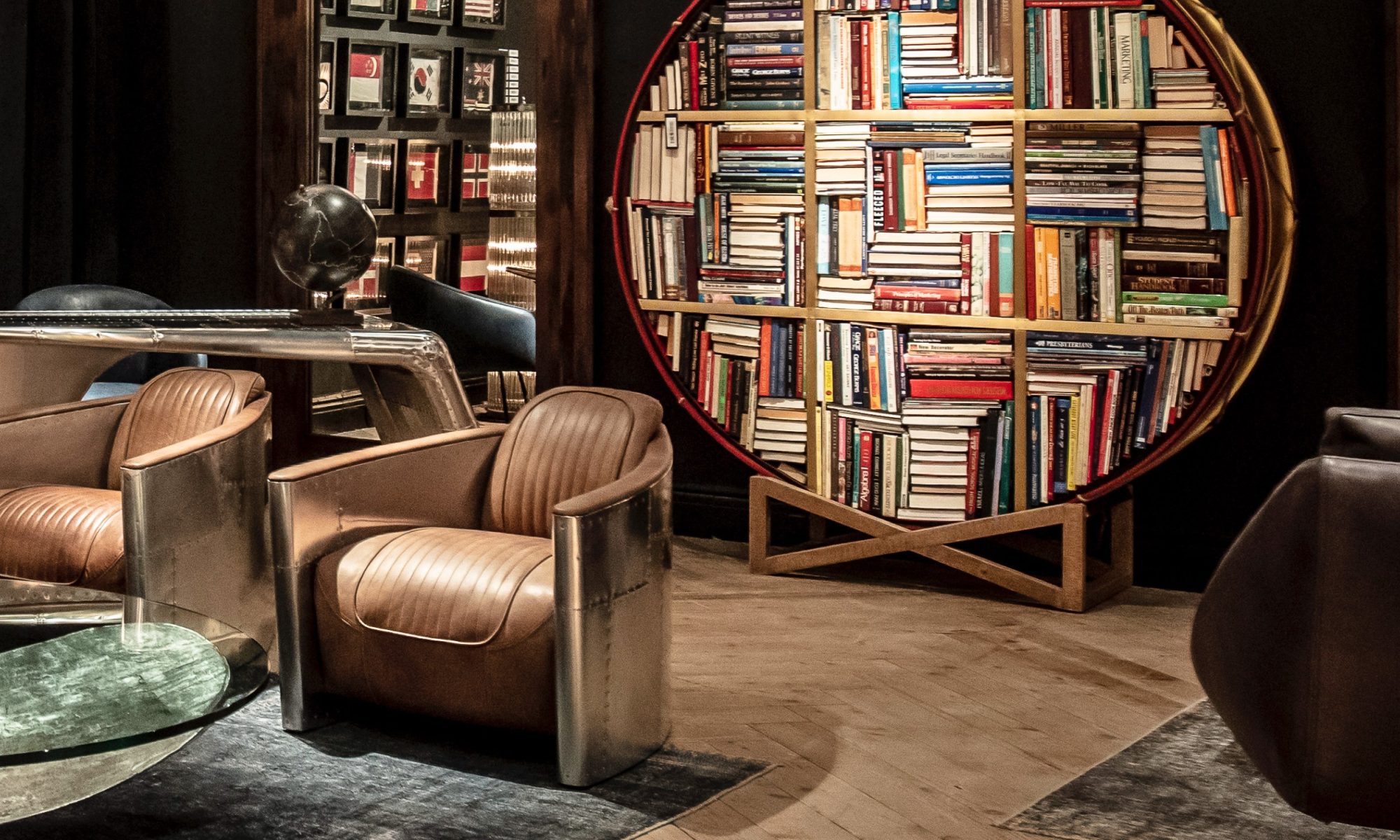Just a quick update on my recent academic excursions. My thesis was accepted for presentation at two conferences and I presented on them in the last two weeks. I talked about my on-going research on Women in NY’s Extreme Metal Music Scene.

The first presentation was at the North East Popular Culture Association conference (NEPCA) in Providence where I was happy to sit on the panel titled “Music and Dance in Popular Culture”, with Professor Jeff Cain from Sacred Heart University as the moderator. I was joined by students Bethany Fagan-Good from SUNY Brockport who presented her paper on “Erick Hawkins Aesthetic: Finding the Dancer” and Matthew Scully from Tufts who presented on “Chester Himes and Frantz Fanon on Blues: Toward a New Humanism”. Each paper was interesting and I was glad to get my feet wet, so to speak, with conference presenting. As an aside, if you’ve read my blog before, I’m pretty enchanted by Fanon’s work, so much so, that I wrote a paper about his inspiration on Fela Kuti and Afrobeat and the correlation with how both Afrobeat and Norwegian Black Metal arose out of the same political and religious oppression. Just sayin’.
In any case, it’s been sometime since I’ve presented or talked in front of an audience. My tenure at Columbia University began in 2012 and because of my new role in Acquisitions, I’ve haven’t had the luxury of teaching classes like I did when I worked at the Met. There’s actually a lot of cross departmental work I miss from my old days there, including providing reference, teaching classes, and cataloging (believe or not!). My current position is more about management, finance, and making sure items are getting ordered and received in a timely matter!

The second conference I presented at was the Metal and Cultural Impact conference (MACI) which took place at the University of Dayton in Ohio. This by far, was one of my most enlightening and engaging conference experiences. I met so many metal music scholars whose work was not only inspiring but fascinating, not to mention I was getting to meet scholars whose work I reference in my own thesis. The topics presented were captivating.
Some highlights included the presentations from the scholars below:
Kevin Ebert – “But that doest help me on Guitar!–Unraveling the Myth of the Self-taught Metal Guitarist”
Dr. Imke von Heldon – “The Pagan Reunion Awaits: The Construction of Cultural Identity in Norwegian Metal Music”
Dr. Ross Hagen – “Pay no Attention to the Man Behind the … Ritualism and Depersonalization in Underground Extreme Metal Music”
Dr. Carl Sederholm – “Answering Cthulhu’s Call: Exploring Lovercraftian Cosmicism in Extreme Metal”
Dr. Jasmine H. Shadrack – “Femme-Liminale: Corporeal Performativity in Death Metal”
Megan McCarty – “Aesthetics of the Brutal: The Voice, Listening Practices and Affect in Extreme”
Alex Skolnick – “Louder Education with Alex Skolnick“
The conference started on Thursday (11/6) and unfortunately I was unable to see the presentations on Thursday as my flight was rescheduled. This was upsetting because with my new obsession with all things gender-related, I missed out on keynote speaker Amber Clifford-Napoleone’s presentation on “Queer Metal Matters: Metal, Sexuality, and the Future“. Fortunately, I did get to speak with her the next day, which helped to alleviate my guilt of missing her keynote address as well as school me on some interesting aspects of queer theory.
Also of great note was getting to see the provocatively creative exhibition by librarian and metal scholar, Brian Hickam. I was happy to meet both Brian and his colleague Elizabeth as they’re both Librarians! Really..I’m sure you can feel my excitement. Brian curated the exhibition titled, “Masked Performance: Facepaint, Head Coverings, and Masks in 21st Century Popular Culture”. He spoke about his experience with metal as both an avid fan and scholar and how he inevitably drew parallels with the use of masks in culture and in heavy metal music.
I also made some new friends, especially Laina Dawes, who also presented on the Women and Metal panel. I’ve mentioned her before on this blog when I brought up reading her book, “What are you Doing Here?: A Black Woman’s Life and Liberation in Heavy Metal“. She discussed the rampant violence towards women and women of color in the extreme metal scene through her presentation entitled, “The Music or the Message? How to Love Music that Doesn’t Love You Back“.
All in all, we even got some help from two metal scholars when our rental car wouldn’t start! Thanks Jamie and Kevin!
Hopefully, the future of metal music studies will see an increase of scholars bringing relevant issues to light within both the metal community and mainstream society. Attending this conference helped to validate my ever evolving interest with metal music, gender, and anthropology. So to my fellow metal colleagues–Keep up the great work!
Finally–A video taping of me presenting at MACI. My husband taped it with his cell phone and we uploaded it to Youtube with hopes of disseminating my research. It’s not the best sound recording quality but it helped me reflect on honing my presenting skills.
Thanks & Enjoy!
Part 1 of 3
Part 2 of 3
Part 3 of 3

